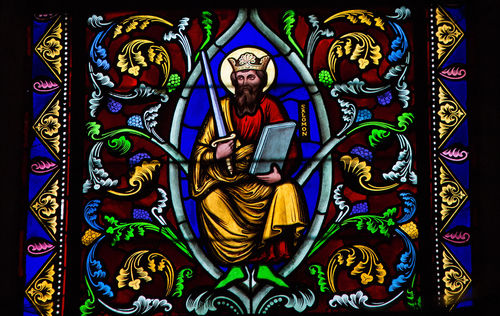After Saint Peter’s in Rome, the most famous church in the world is the ancient Hagia Sophia in Istanbul. People often — mistakenly — think that the church is dedicated to a woman named Saint Sophia. It’s not. Hagia Sophia is simply Greek for “Holy Wisdom.”
In the sixth century, the Emperor Justinian built this Church as a monument to the wisdom of God. He commissioned a brilliant architect named Anthemius to design the most magnificent house of worship in all of history, outdoing even the Temple of Solomon.
Anthemius set out to build a colossal church with an enormous dome — but he also wanted it to be brilliantly bright inside. And that was no easy task in those years before artificial light.
Anthemius drew up plans for a huge, shallow dome set on half-domes, which in turn were set on four widely spaced piers. Circling the dome were so many windows that the dome seemed to float above the church. When sunlight shone through those windows, it reflected on the tiles of gold mosaics. The effect was dazzling. It looked like the sun itself had come inside to celebrate the Mass.
When the construction of Hagia Sophia was completed, the emperor stepped inside, and the church looked brighter inside than the day was outside. He laughed with joy and announced that, with this new temple, he had surpassed even the biblical King Solomon.
Wisdom was the brand of Solomon. Before the coming of God in the flesh, he was renowned as the wisest man who had ever lived.
But Jesus, his descendant, was wiser still. Jesus, in fact, is wisdom itself — holy wisdom — divine wisdom. Jesus is the reason Justinian built his church to be grand and Anthemius designed it to be brilliant.
Catholics and Jews have the most profound reverence for wisdom. A large chunk of our Old Testament is dedicated to what we call “wisdom literature.” That category includes the Book of Job, the Book of Psalms, the Book of Proverbs, Ecclesiastes, the Song of Songs, the Wisdom of Solomon, and the Book of Sirach.
We are not alone in our desire to be wise. Everybody wants to be wise. But Jesus alone shows us how.
One and all, the great pagan philosophers — Plato, Aristotle, Epictetus, Plotinus — sought and strove to gain wisdom by dint of their mighty efforts. They all fell short, even the most intelligent of them fell far short.
We would do well to desire wisdom as they did. We would do well to seek it as ardently as they did. But we have an advantage. We can go to Jesus.
Jesus is God’s wisdom. He is God’s eternal Word who came to dwell among us. He is more brilliant, in fact, than the celestial sun that filled Hagia Sophia. And he is present for us, in all that brilliance, at every liturgy. He fills the liturgy with the brilliance of heaven.
Every time we go to Mass, wherever we go to Mass, we go to “Hagia Sophia.” We go to holy wisdom, and we receive holy wisdom. We become partakers of the divine nature (2 Peter 1:4). We receive as a gift what the ancient philosophers hungered for, but could never achieve.
At Hagia Sophia there is an ancient icon of Jesus. It portrays him sitting on a throne, holding an open book and giving his blessing. The text in the book says: “Peace be with you. I am the light of the world” (see John 8:12).
I’m not an exceptionally wise man by any measure, but I do know this much. To be wise is not to have all the answers. To be wise is to know where to go for answers.
Go to Mass. Get Jesus. Hear him in the Word. Receive him in the Eucharist. Do it every Sunday and holy day. And do it every day if you can. That’ll get you wise — wiser even than Solomon.

